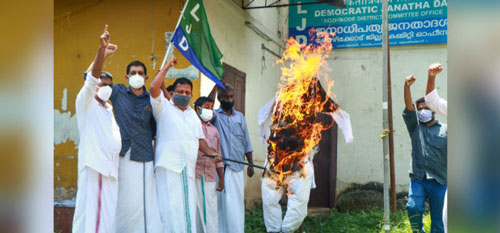Tarushi Aswani
In the six months since the appointment of Praful Khoda Patel as the administrator of the Lakshadweep islands, the idyllic archipelago has been introduced to draft bills and orders that the locals label as “draconian” and “arbitrary”.
These orders and draft bills are just the beginning of what Patel calls ‘developmental design’ – his plan to make over the islands and their people so that Lakshadweep becomes a luxury tourism destination.
However, some of the draft bills and orders show a distinct lack of understanding of Lakshadweep’s social, cultural and topographical landscape.
Others that target dissent seem similar to draconian laws that have long been in place in Jammu & Kashmir, besides the new measures taken by the police and administration to curb criticism after Article 370 was read down in 2019.
Altogether, according to several politicians and civil servants as well as many ordinary Lakshadweep residents, what is happening in Lakshadweep at this time appears to resemble what has been happening in J&K at least since 2019.
The Communist Party of India (Marxist) has condemned Praful Patel’s policies in Lakshadweep, stating that they reveal “shades of the Kashmir experience” but that the “real model” being pursued is the “Gujarat one”.
On May 31, the Kerala assembly unanimously adopted a resolution seeking the removal of Praful Patel from all his responsibilities as Lakshadweep’s administrator and Kerala’s chief minister, Pinarayi Vijayan, said that the Sangh Parivar was looking at Lakshadweep as a laboratory for their Hindutva politics.
System changes
Meanwhile, Mohammed Faizal, Lakshadweep’s only member of Parliament (MP), has been trying to understand what Praful Patel has been aiming to do.
“He is only copying what he tried to implement in the Union territories of Daman & Diu and Dadra & Nagar Haveli when he was their administrator,” said Faizal.
“But while Daman & Diu and Dadra & Nagar Haveli are both on the mainland, Lakshadweep is a very small eco-sensitive zone with a fragile ecology which cannot withstand such development.”
Patel’s plans dig deeper into the system than the words ‘developmental design’ imply, said Faizal, pointing out that just as the administrator had done in Daman & Diu and Dadra & Nagar Haveli, he retrenched 200 contractual employees of the central government’s sponsored schemes in Lakshadweep during the pandemic and without the knowledge of the Centre.
“The administrator has only spent 15-20 days in the islands during his six-month tenure. How can he pass such draconian orders without understanding the basic lifestyle of the locals?” asked Faizal.
Faizal also questioned the model of development on Patel’s mind given the draft Lakshadweep Development Authority Regulation, 2021 (LDAR).
According to the MP, the people of Lakshadweep have been given constitutional protection of their land, which means the land belongs to the people of Lakshadweep and no outsider can claim it.
A massive 94% of the population in the region comes from Scheduled Tribes and the new development plan violates their constitutionally guaranteed rights.
“So, these regulations are being drafted to legally take away the locals’ land and hand it over to big corporates on long leases,” alleged Faizal.
Lakshadweep, Faizal told The Wire, contributes 4.02 lakh sq km to India’s exclusive economic zone (the area of the sea over which a nation has special rights to exploit and use marine resources). Yet, he pointed out, Patel is not interested in developing this zone.
Rather he plans to occupy more land for development than the islands can ecologically bear. Patel, said Faizal, wants 20-metre roads where three-meter roads are sufficient.
The only thing that stops Faizal from comparing the LDAR with the amendment in the Jammu and Kashmir Development Act which allows the armed forces to notify ‘strategic areas’ for themselves is the fact that the LDAR is still a draft bill.
“Yet, even as a draft, the LDAR draws so much dissent,” he told The Wire. “If it becomes the law, I will be forced to make comparisons between Jammu & Kashmir and Lakshadweep.”
The introduction in January 2021 of PASA (Prevention of Anti-Social Activities Regulation), colloquially known as the Goonda Act, under which the administrator can jail individuals for up to one year without trial, was clearly a measure to intimidate the people of Lakshadweep, said Faizal.
Disempowering the people Faseela Ibrahim, a lawyer from Minicoy Island, agreed with Faizal’s belief that PASA was introduced in Lakshadweep to frighten its populace.
“PASA is symbolic of the scuttling of dissent throughout the country,” said Ibrahim. “According to National Crime Records Bureau data, Lakshadweep has the lowest crime rate in India.
Bringing in PASA, which allows preventive detention without trial, is unnecessary and unjustified.”
Ibrahim makes it a point to list the chronology of the introduction of the various new regulations in Lakshadweep.
“Once the administrator arrived, the pandemic standard operating procedures were removed and PASA was immediately brought in,” said Ibrahim.
“After that the Panchayat Regulations and the Lakshadweep Development Authority Regulation, 2021, were brought in. PASA takes care of the dissenting populace.
The administration has understood that the people of Lakshadweep know their rights and they will not keep quiet.”
The Panchayat Regulations and another draft bill propose to prevent people with more than two children from contesting elections.
Given that Lakshadweep has no legislative assembly, the panchayats are the islands’ only democratically elected bodies, Ibrahim pointed out. Any curtailment of their powers is an attack on the Union territory’s limited democracy.
But the Panchayat Regulations propose to remove the administrative, political and financial powers of the local bodies.
Another order in May talked about removing the panchayats’ powers in matters of agriculture, animal husbandry, education and health services.
Tarushi Aswani is a freelance journalist based in Delhi. She tweets at @tarushi_aswani.
—Courtesy The Wire










